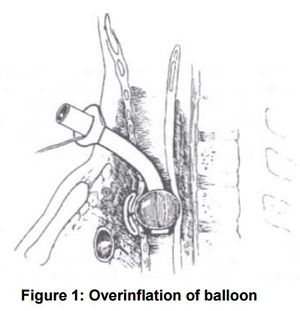We need you! Join our contributor community and become a WikEM editor through our open and transparent promotion process.
Tracheostomy bleeding
From WikEM
Contents
Background
- Pts who have undergone a laryngectomy cannot be orally intubated
- Average size:
- Adult: 5-10mm
- Peds: 2.5-6.5mm
Clinical Features
- Minor bleeds within first few days usually due to:
- Lack of hemostasis
- Tube suction and manipulation
- Tracking of blood from nearby surgical site
Risk Factors
- Infection
- Corticosteroids
- Diabetes
Differential Diagnosis
Tracheostomy complications
- Tracheostomy obstruction
- Tracheostomy dislodgement
- Tracheostomy infection
- Tracheostomy bleeding
Evaluation
- Large bleed is tracheoinnominate fistula until proven otherwise
Management
- Local Bleeding
- Use silver nitrate if bleeding source is identified
- Brisk Bleeding
- Tracheoinnominate artery fistula (TIF) until proven otherwise
- Most patients present within first 3wk after tracheostomy
- Very high mortality rate
- Delegate team member to obtain surgical assistance, especially with massive bleed
- Treatment:
- Hyperinflate the cuff (85% successful), up to 50 cc to tamponade bleeding
- If above fails, withdraw tube while placing pressure against anterior trachea
- ETT from above (as long as there is no laryngectomy)
- Apply digital pressure of innominate artery against the manubrium from inside tracheostomy tract
- Go to the OR with finger tamponade innominate artery
- If above fails, place a cuffed ET tube to prevent pulmonary aspiration of blood
- Correct coagulopathies and administer blood products as needed
- Requires emergent OR exploration and definitive management
- Tracheoinnominate artery fistula (TIF) until proven otherwise
Disposition
- Emergent OR for TIF
- Most minor bleeds do not require admission and observation if controlled in ED
- Consult with primary surgeon for new tracheostomies
See Also
External Links
References
- Allan JS, Wright CD. Tracheo-innominate fistula: diagnosis and management. Chest Surg Clin NA. 2003;13(2):331-41.


